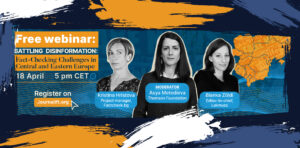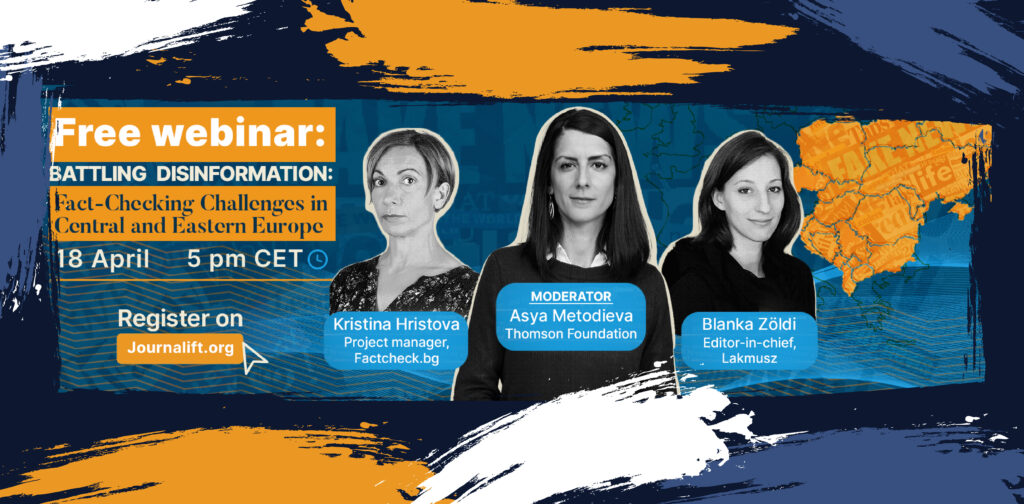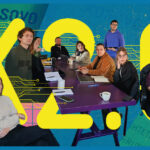According to the research undertaken in all regional countries, women are considerably less represented in the media content compared to men, which is particularly visible in the percentage of cited female and male experts, counterparts and commentators to different topics, and also substantiated in the summarised desk research “Gender and the Media” published with the support of the British Council, BIRN and Thomson Foundation.
This is especially true when it comes to news and “serious” topics, including politics and economy.
In practice, in most of the cases women are portrayed either in traditional and family roles- as mothers and wives, or as sexualised and objectivised beings, which is particularly the case with women present in the public.
However, even when women are involved as experts, the nouns used are usually not gender- sensitive, thus contributing to them being erased from the language. As outlined by the linguist and feminist author, Svenka Savić, such practices lead to women remaining invisible in social and political spheres, which finally only corroborates patriarchal perception of women in the society.
“We don’t need to explore the media content too deeply to notice the pronounced dominance of the grammatical masculine gender use, especially in professions and titles, despite the fact that the grammar structure of our language also provides for the feminine gender,” explains Selma Zulić Šiljak from the Mediacentar.
In the period between September and December 2021, fourteen youth media from six Western Balkan countries supported through the focused mentorship programme, had worked on developing newsroom practices and improving production in different domains, inter alia, in the area of implementation of gender- responsive policies in their newsrooms, and in production of media content highlighting issues and barriers to gender equality implementation in the Western Balkans. This educational programme focusing on youth media was delivered under the Media for All project Youth Strand component implemented by the British Council, BIRN and Thomson Foundation, coordinated by the Mediacentar Sarajevo.
Integrating mentorship in the area of gender-responsive policies in the media newsrooms is of utmost importance.
As consecutively indicated in the Global Media Monitoring report, being aware that the prevailing global trend of degrading position of women in the media profession, low level of women representation in the media managerial structures and gender pay gap observable in the media industry adversely affect women, the media will have much more to improve in achieving a better and fairer work environment.

Contrasting such global trends, nine youth media particularly focusing on gender- responsive policies, portrayed a somewhat different picture regarding the work of the media gathering youth and writing for the youth. Namely, youth media do recognise the problem of gender inequality in the media and are aware of the importance of changing such a practice, as emphasised in their presentations at the Youth Strand regional event and panel “Gender- sensitive practices and youth media” delivered on 16 December 2021.
The media involved in the programme worked on developing several important policies specific to the operation of youth media. For example, they have developed the Guidelines for collaborators and volunteers on the use of gender-sensitive language and Guidelines on the prevention of sexual harassment at work and in the work environment, and they also developed their mission and vision statements to demonstrate the importance of gender equality in the media work.
“The Guidelines on the use of gender-sensitive language” is a document aimed at both in-house journalists, and external collaborators and volunteers, often engaged by the youth media.
“Basically, this document ought to be a part of editorial policy. The terms indicating positions, professions, occupations, functions, titles, workplaces of women, should be used in feminine grammatical gender,” explains Selma Zulić Šiljak.
Milena Vujović, who introduced the work of the Mingle portal operating under the Belgrade Open School, says that Serbia is still a society far away from gender equality, and that youth portals like Mingle do recognise the importance of this issue and report on it in scope of their work.
Jointly with her mentor on the gender-sensitive or gender equality-related content development, the Mingle portal journalist created a text and a video entitled “Why I’m entitled to care about the (in)visible practices of disrespecting women?“ addressing the importance of the use of feminine gender in language. As underlined by Vujović, the Belgrade Open School, as the Migle portal umbrella organisation, has already developed gender equality policy even before this project, however the mentorship provided helped additionally clarify and elaborate parts of this policy and thus contribute to its clearer implementation.

One of the media with national frequency, O radio (Youth Radio) from Novi Sad, invests efforts in developing gender equality.
“All of us are already very conscientious about language gender sensitivity. Still, we do not have respective documents to this topic, we do not have specific policies developed. Unfortunately, in Serbia there are insufficient media addressing these topics,” says Jelena Božić, O radio journalist.
O Radio is the place where young people from the Novi Sad School of Journalism are taking their baby steps in journalism.
“We are proud to be able to use gender-sensitive language in our stories and teach young people how to use it. We all want to do it, but sometimes we simply don’t know how to put it to practice, so we consult books and available sources to learn how to use gender language in practice,” states Božić.
Edona Shala, a journalist of the KosovaLive, says that her colleagues have made a proposal to their editors to jointly compile a document on gender equality and the use of gender-sensitive language in their stories.
“We have always been aware of this, but now we have a specific document we use as a guide. Currently we are at the document finalisation stage, and its implementation will follow. I believe this is a good way to promote gender equality, and I hope everybody will find it useful,” says Shala.
Younger generations of journalists are more aware of the gender-sensitive language use. One of the examples is Zoomer.rs, youth internet portal that emerged within the E8 community with a purpose to contribute to dissemination of media literacy and culture.
The portal’s editor-in-chief, Nemanja Marinović, speaks about how their gender equality documents were developed, and that now they have documents forming one of the platforms of their work.
“We have developed the use of gender-sensitive language, and we try using this language in audio and video formats and in our articles. But, if we didn’t have these documents, then the young people joining us would not have an opportunity to think about these things. They say their text “does not sound good enough”. We tell them to write it like that and that their text will still be a good text,” explains Marinović.

Milena Vujović from the Mingle portal says that introduction of the gender-sensitive language in the media is the simplest task of all, and that this is the minimum everyone should be doing.
“Our languages linguistically and grammatically recognise gender-sensitive language. We have established gender policies that need to form the basis of our work, especially in the area of violence prevention and anti-discrimination, and enhanced tolerance and human rights protection,” states Vujović.
However, Vujović stresses that the practice of journalists and editors failing to implement international and national gender equality standards, despite such standards being set forth by the legislative framework, is often encountered in the Balkans.
In the WB countries, irrespective of any documents on gender equality being introduced in the media newsrooms, their implementation is often not mandatory, so sometimes it seems like tilting at windmills.
Back in 2011, a handbook “The ways of combating linguistic discrimination in education, media and legal documents” authored by Jasmina Čaušević and Sandra Zlotrg was presented in Bosnia and Herzegovina.
The handbook is the result of six-month work on the project “Gender-sensitive language in education, media and legal documents” funded by the Financial Mechanism for the Gender Equality Action Plan implementation in Bosnia and Herzegovina.
Legal framework for this handbook is the Law on Gender Equality of Bosnia and Herzegovina (2003) and the Anti-discrimination Law of Bosnia and Herzegovina (2009). These normative acts are rooted in the Universal Declaration of Human Rights and International Convention on the Rights of Persons with Disabilities.
“The Law on Gender Equality of Bosnia and Herzegovina sets forth the use of gender- sensitive language and defines the use of a single grammatical gender as “linguistic discrimination”. What it takes is simply not to give up and use every opportunity to point out the fact why this is important, especially in work with the media,” says Selma Zulić.
Karine Henrotte Forsberg, ex chairperson of the Council of Europe Gender Equality Group, emphasised that in the Western Balkans countries there was still a practice of women quitting their corporate jobs and giving up on their full-time careers when so required by the family needs.
“This leads to the fact that women continue to account for the majority among the unemployed and low-paid individuals,” said Henrotte Forsberg. She thinks that the media are the key tool, since they can influence and shape political agenda. “The media may affect re-shaping public opinion and positions of decision-makers, and contribute to and act as a vehicle for awareness- raising. Moreover, the influence of the media in designing and maintaining values and norms is also very important,” she underscored.
Finally, Selma Zulić Šiljak underlines the importance of working with media editors and changing policies in practice, and projects like the “Youth Strand” show the change is possible.
“The next step would imply implementing policies in practice in order to allow language to become alive, since the language in use is “alive” and its full potential ought to be used. In that context, editors surely have their own role to play in recognising the importance of the gender-sensitive language use, but in addition, editors ought to acknowledge that gender-sensitive language is just one of the gender equality aspects, and that it takes much more attention to eliminate adverse gender stereotypes from the media content,” Zulić concluded.































